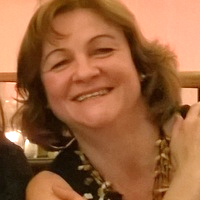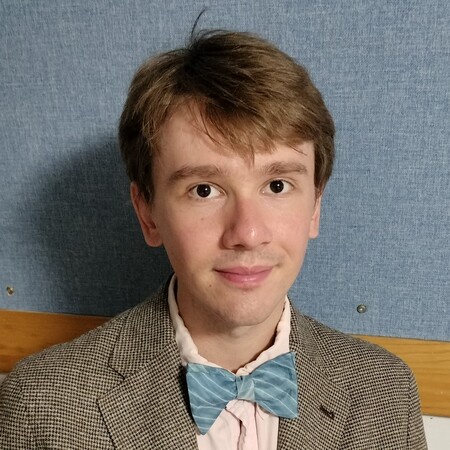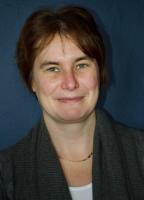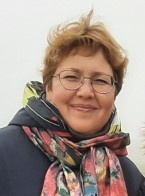- Professor Robert Frost (History) DIRECTOR
-

I had no family connections with the region, but I was then looking for a topic for my doctorate, and it seemed strange that there should be so little written about a multiethnic, religiously plural political union that had lasted over four centuries and had formed the largest polity in Europe apart from Russia.
I lived for two years in Poland in the early 1980s, learning Polish, living through the Year of Solidarity and the Year of Martial Law, and carrying out research for my doctorate on Poland-Lithuania and the Second Northern War, 1655-1660, which I wrote under the supervision of Norman Davies at the University of London.
My main scholarly focus has been the history and legacy of this unique political union outwith the confines of the national histories that had long dominated the writing of the history of this fascinating region of Europe.
- Professor Karin Friedrich - History
-

At Georgetown University (Washington D.C.), my doctoral supervisor, Andrzej Sulima Kamiński, pointed me towards Royal or Polish Prussia.
I learnt Polish in the aftermath of the fall of communism in Poland, where I spent a fascinating year conducting research for my doctorate on the identities of the German-speaking, Protestant urban elites of Danzig/Gdańsk, Thorn/Toruń and Elbing/Elbląg, who aspired to live in a monarchy with a republican constitution, before they were annexed by the absolute monarchy of Hohenzollern Prussia. Their system of republican self-government and the liberties they had enjoyed as part of the Polish crown were rudely ended.
As a native of Bavaria, I could fully grasp the trauma caused for many by absorption into the culturally very different kingdom of Prussia, a trauma ignored by nineteenth-century nationalist historians, who assumed that the Royal Prussians were desperate to 'throw off the Polish yoke'. Since then, my research has explored many aspects of the entangled histories of both Prussias and Poland-Lithuania in the early modern period.
- Dr Helen Lynch - English
-
Check Helen's Profile

- Dr Marcel Garboś - History
-

In 2021, Marcel completed his doctorate in the History Department at Harvard University, where he wrote a dissertation on projects for the geopolitical reorganization of the imperial Russian and Soviet spaces that developed across revolutionary networks in the Eurasian borderlands between the late nineteenth century and the Second World War.
His current research investigates the international origins of federalist thought and politics in the Russian Empire, focusing on non-Bolshevik socialist movements that led the struggle for post-imperial decentralization on the eve of the October Revolution and beyond.
Marcel's other interests include a genealogy of cross-border weaponized nationalism in the interwar Soviet Union and the Second Polish Republic as well as an inquiry into the transnational formation of concepts of property, territory, and nationhood in the Russian, German, and Austro-Hungarian borderlands before the First World War. Marcel has previously taught at Columbia University, UNC Wilmington, and George Mason University, while his work has appeared in Europe-Asia Studies, Harvard Review, Rocznik Przemyski, and The Slavonic and East European Review
- Professor Catherine Jones - English
-

Her books include Literary Memory (2003), Scotland, Ireland, and the Romantic Aesthetic (co-edited with David Duff, 2007), and Literature and Music in the Atlantic World, 1767-1867 (2014), awarded the annual book prize of the British Association for American Studies.
She is currently working on a monograph entitled Life-Writing and Portraiture in Early Modern Europe and Russia, which, focusing on the period from the Ukrainian Cossack Uprising (1648) to the end of the Napoleonic Wars (1815), is centrally concerned with the impact of the intellectual and cultural movements of Enlightenment and Romanticism on ideas of character and selfhood.
Other work-in-progress includes a book chapter on 'Foreigners in Muscovy and the Hetmanate in a Time of War and Popular Revolt (c. 1655-c.1721)' for the collection, Knowledge Networks in Northern Europe, 1550-1750: Mapping a Cosmopolitan Circulation of Ideas, edited by Cassie Gorman and Stefano Gulizia; and a series of essays on literature and Romantic pianism from the age of Franz Liszt (1811-1886) to that of Alexander Scriabin (1872-1915).
- Dr Derrick McClure
-

- Mr Dan McCollum
-

Research: I studied Secondary Education and History for my undergraduate degree at Northern Michigan University in Marquette, MI. After two years of teaching in the Alaskan Bush, I returned to higher education at North Dakota State University where I explored the third-party political movements within the Upper Midwest.
Following this, I taught as an adjunct instructor for Concordia University of Wisconsin from 2015-19, acquired a second Masters degree in Library and Information science from the University of Wisconsin - Milwaukee and worked as an archival assistant through the Ward Irish Music Archive. I began my studies at the University of Aberdeen in 2020, under the supervision of Drs. Robert Frost and Colin Barr.
Currently, I am examining the role of Irish and Polish Catholic priests within the Upper Midwest with a particular focus upon their efforts to craft and preserve ethnic identities amongst their parishioners.
My research interests include 19th and 20th century American religious, cultural and migration histories, especially as they pertain to the Irish-American and Polish-American communities, and I maintain a lively passion for the regional history, culture and lore of America's Upper Midwest.
- Mr Paweł Grabowski
-

Research: I carried out my undergraduate studies in History and Political Science at Trinity College Dublin, where I studied the histories of medieval Germany, France, England, and Scotland.
At Aberdeen I am currently working on my doctoral dissertation on Polish-Valois Burgundian connections under the supervision of Robert Frost and Karin Friedrich. My PhD probes the extant primary material through a multi-theme approach for points of ingression into the multifarious links and affiliations that involved the kingdom of Poland and Valois Burgundy in the Later Middle Ages.
My research interests include inter alia the Jagiellonian polities, Valois Burgundy, the Holy Roman Empire, the Ottomans, the development of cross-European connections in medieval Europe, and the history of knowledge.
- Dr Natalia Gromakova - History (Honorary Fellow)
-

She received one of eight scholarships awarded by the University of Aberdeen to displaced Ukrainian scholars in 2022-2023, as well as a scholarship from the German Historical Association.
Dr Gromakova's research focuses on Polish-Ukrainian relations in nineteenth-century Ukraine, which is a topic of great interest to the Centre.
- Professor Larysa Buriak - History (Honorary Fellow)
-

She was a visiting professor at the University of Alberta (Canada) and held a Kolasky Visiting Research Fellowship in the Humanities and Social Sciences, Law, Education, and Library Sciences at the Canadian Institute of Ukrainian Studies, Edmonton, Canada (2018).
She is a co-editor of the collections Ukrainian biography=Biographistica Ukrainica and Manuscript and book heritage of Ukraine and is a member of the board of the Ukrainian Association of researchers in Women History .
Her research interests include the theory and methodology of biographical studies, (auto)biography, women's (auto)biography, visual (auto)biography, and memory studies. She is interested in exploring the forms of biographical reconstructions, as well as their interpretation in the context of cultural and social transformations.
Her recent research focuses on the political and intellectual history of Ukraine in the twentieth century in the European context, the history of Ukrainian emigration to Great Britain after 1945 and during the Cold War.
She is currently based in Aberdeen following the Russian invasion of Ukraine.
Projects
- Federalism and the fate of Europe's borderlands: the transnational search for alternatives to empire and ethnic nationalism in Eastern Europe, 1880s-1960s.
This project is being conducted by Marcel Garboś, who was awarded £335,000 for a three-year British Academy International Fellowship that commenced on 1 February 2024. It looks at neglected Eastern European federalist movements from across the western and Eurasian borderlands of Russia, whose intellectual centre lay in the lands of the former Polish-Lithuanian Union, which emerged from the 1880s as a laboratory for federalist ideas that sought alternative models to the Russian Empire, and then the Soviet Union. Marcel has a special interest federalist ideas and plans among socialists and communists, and shows that there was far more to east-European federalism than Józef Piłsudski's plans to create a federal version of the former Polish-Lithuanian Commonwealth. Federalist ideas attracted support from a wide range of national groups in the borderlands of the former Russian Empire. His project demonstrates that current debates concerning self-determination, federalism, political union, and internationalism have deeper roots in the classic age of nationalism than is often appreciated
- Entanglements and Disentanglements. Towards a Transnational History of Poland and its neighbours.
This is a collaborative project with the Jagiellonian University, Cracow, and Charles IV University, Prague, funded largely by the Jagiellonian University, with contributions from CPLS, CEMS and Prague. It has held three workshops in Aberdeen (May 2023), Prague (January 2024) and Cracow (June 2024) and is currently preparing a volume for publication, with articles by Robert Frost, Karin Friedrich, Helen Lynch, Marcel Garboś, and Paweł Grabowski. At the last workshop in Cracow, Paweł and Marcel delivered papers on Polish-Burgundian relations and the varieties of Polish federalist thought respectively. In a training day for postgraduates from the Jagiellonian History department, Helen Lynch ran two popular sessions on creative writing, Robert Frost and Karin Friedrich ran sessions on getting published in English and applying for research funding, Paweł Grabowski and Cameron Flint discussed postgraduate life in the UK, and Marcel Garboś led a similar session on the USA.
- Recovering Europe's Parliamentary Culture, 1500-1720.
Robert Frost and Karin Friedrich have been involved in this collaborative pilot project with the Universities of Oxford and the Jagiellonian University, Cracow, funded by the Jagiellonian University with contributions from CPLS and CEMS. The project compares the Polish-Lithuanian Sejm with the Scottish, Irish, and English parliaments. Both have contributed blogs to the project website, and Robert is lead author on a collaborative chapter on parliaments and political union, and has contributed to a further chapter on parliamentary communities. The project has held workshops in Warsaw (May 2023) and Aberdeen (May 2024) and presented chapter drafts at a session of the annual Recovering Forgotten History conference, funded by the Museum of Polish History (Warsaw, June 2024). A volume is being proposed to OUP. Once the pilot project is complete, wider funding will be sought for a project that is extended across early modern Europe: https://intellectualhistory.web.ox.ac.uk/recovering-europes-parliamentary-culture-1500-1700#/
- Ukrainian Global History Initiative
Robert Frost has been awarded £67,500 by the Ukrainian Global History Initiative (UGHI) https://uhgi.org/ , to buy out his teaching for the academic year 2024-5. The UGHI is an international charity, registered in the UK, whose aim is to explore Ukraine's place in global history across the ages in the light of the current war. Although most of the 90 scholars involved in this three-year project are historians, the project is fundamentally interdisciplinary, and will also look at natural history, zoology, paleontology, and archaeology in its study of the region and its peoples. Robert is contributing a reassessment of the historical relationship of the Ukrainian lands and their peoples with the Grand Duchy of Lithuania and the Kingdom of Poland from the Mongol invasions of the mid-thirteenth century until the 1667 Treaty of Andrusovo, the first partition of Ukraine.
- Dr Rose Luminiello - History (Former PhD Student)
-

Under the supervision of Prof. Robert I Frost and Prof. Michael Brown, I wrote my doctorate, Confronting Modernity: Leo XIII, 'Rerum Novarum' and the Catholic Church in Ireland and Prussian Poland, 1878-1914 with funding from the Centre for Citizenship, Civil Society, and Rule of Law (CISRUL) at the University of Aberdeen.
I'm currently working on a monograph derived from the dissertation, positing that the emergence of Catholic Social Teaching in 1891 revolutionized the religio-political identities and Catholic communities in Ireland, Poland, and the Americas. I am particularly interested in how Polish Catholics develop political and social identities within concepts of civil society at home and abroad.
In my current post as a jointly funded Research Fellow at the Research Institute of Irish and Scottish Studies at the University of Aberdeen and the Cushwa Center for the Study of American Catholicism at the University of Notre Dame, I'm researching not only intellectual and political developments in Polish and Irish Catholic communities, but also the actors who perpetuate, resist, and shift political concepts in the community within the ranks of the Church itself, through the social work of women religious (religious sisters/nuns).
